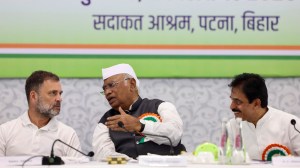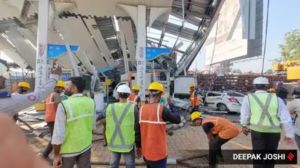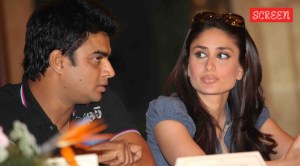Don’t tell India Shining to these Dalits
Just 25 kilometres away lies Mahad, where Dr B R Ambedkar launched his campaign against untouchability over six decades ago. But for the Dal...

Just 25 kilometres away lies Mahad, where Dr B R Ambedkar launched his campaign against untouchability over six decades ago. But for the Dalits of Kuravade, a dusty village in Mangaon taluka of Raigad district, it may as well have been another world. It’s been a year since they were socially boycotted by the rest of the village, and they’ve been struggling to cope with its effects ever since.
Their crime: they drew water from the common vilage well. That too only after some miscreants threw human excreta in the well near their hamlet, following an altercation with them. This happenned in March last year. It was a local NGO, Sarvahara Jan Andolan, which staged a satyagraha and encouraged the Dalits to draw water from the common well.
The local administration intervened in order to avoid a confrontation. It laid pipelines and provided tap water at a few common places in the village, including a separate tap for the Dalit families. But it was too late. Angry villagers decided to boycott the Dalits. And with 75 upper caste families as opposed to the 10 Dalit families, the latter hardly had any say.
‘‘It’s been a year since we raised our voice against the injustice. Upper-caste villagers have boycotted us,’’ says Anant More. All the inhabitants of this village, 150 km from Mumbai, have the same title: More.
‘‘Earlier, we used to get invitations for weddings and pujas in the village. If somebody failed to go, they used to send meals to his house. All that has stopped. Nobody from the village invites us now,’’ says Vandana More.
It doesn’t stop at that. The Dalits, most of whom have some agricultural plot, are finding it hard to cultivate their land. The villagers are not renting out their agricultural tools. Nor are upper-caste labourers agreeing to work on their land. ‘‘I had to hire labourers from a remote village. So I had to pay them more,’’ points out Sahdev More, a retired constable.
However, the upper-caste families dismiss the allegations. ‘‘There is no such problem here. Just one or two Dalits say this, and you outsiders believe them,’’ claims an elderly villager.
Although Kuravade may be considered a Shiv Sena stronghold, the local MLA is NCP’s Sunil Tatkare. But his party does not want to offend the upper-caste families, who form a chunk of the vote-bank. The Dalits, after all, are in a minority.
Not surprising then that the Dalits are not too keen to cast their vote. ‘‘Let’s see. If someone comes to us to campaign, we will think whether to vote or not,’’ says Anant.
As for the administration, it clearly doesn’t know what to do. ‘‘We tried to solve the problem by providing tap-water supply in these villages. But untouchability cannot be erased from their minds in a short time,’’ says Vishwas Patil, Chief Executive Officer of Raigad Zilla Parishad. ‘‘I am sure they will be back on talking terms sooner or later,’’ he hopes.
Photos


- 01
- 02
- 03
- 04
- 05





























